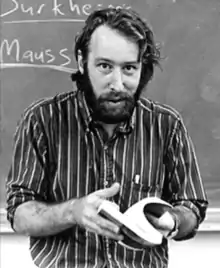Daniel Nugent
Daniel Nugent (1954-1997) was an American anthropologist and professor at the University of Arizona. His most notable works include Everyday Forms of State Formation, a co-edited collection of essays about state formation in modern Mexico[1] and Rural Revolt in Mexico: U.S. Intervention and the Domain of Subaltern Politics, an edited collection of essays about subaltern politics in Mexico.[2] Nugent was also a playwright, and he co-wrote the play 13 Days/Los Trece Dias: The Zapista Uprising in Chiapas which toured nationally from 1996 to 1997.[3][4] He died in Tucson at the age of 43.[5]
Daniel Nugent | |
|---|---|
 | |
| Born | 1954 |
| Died | October 15, 1997 (aged 43) |
| Nationality | American |
| Alma mater | University of Chicago (Ph.D.) |
| Known for | Historical anthropology State formation |
| Scientific career | |
| Fields | Anthropology |
| Institutions | University of Texas at Austin, University of Arizona |
| Influences | Friedrich Katz |
Education
Nugent attended the University of Chicago for undergrad, where he befriended future historians such as Paul Gootenberg.[4] After a brief period where he studied at Oxford University, he returned to the University of Chicago to obtain his Ph.D under the guidance of radical anthropologists Terry Turner and John Comaroff. His work was heavily influenced by Friedrich Katz.[4]
Career
Nugent began his academic career at the University of Texas at Austin, where he directed the Mexican Center at the Institute of Latin American Studies for two years.[5] In 1990, he moved to the University of Arizona as an assistant professor of anthropology. By 1991, he was elected as a fellow of the American Anthropological Association. While at the University of Arizona, he wrote Spent Cartridges of Revolution, edited Rural Revolt in Mexico and U.S. Intervention, and served as an editor of the Journal of Historical Sociology.[5] He was also involved with the Political theatre movement, including with the San Francisco Mime Troupe and the Borderlands Theater. He co-wrote the play 13 Days/Los Trece Dias: The Zapista Uprising in Chiapas with his wife Eva Tessler.[4][6]
References
- "Everyday Forms of State Formation: Revolution and the Negotiation of Rule in Modern Mexico". Duke University Press. Duke University. Retrieved 13 November 2020.
- "Rural Revolt in Mexico: U.S. Intervention and the Domain of Subaltern Politics". Duke University Press. Duke University. Retrieved 13 November 2020.
- "Borderlands Theater presents: Los Trece Días/The Thirteen Days". Critique of Anthropology. 19 (4): 326–372. December 1, 1999. doi:10.1177/0308275X9901900402. Retrieved 13 November 2020.
- Gootenberg, Paul (February 1998). "Daniel Nugent (1954-1997)". The Hispanic American Historical Review. 78 (1): 117–119. Retrieved 13 November 2020.
- Rich, Leigh E. "'Revolutionary' play combines traditional and modern". Arizona Daily Wildcat. University of Arizona. Retrieved 13 November 2020.